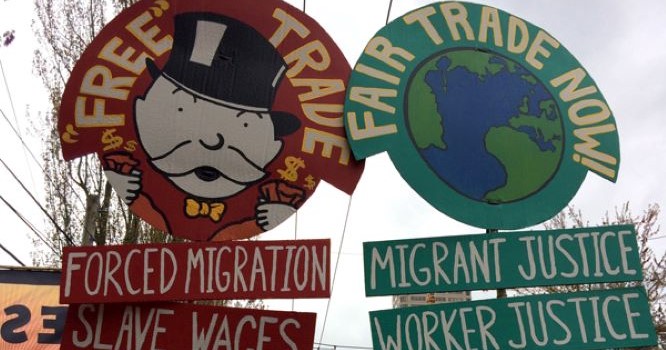Belabored: Why “Corporate Social Responsibility” Fails Workers
Belabored: Why “Corporate Social Responsibility” Fails Workers
A close look at what happens when corporations police themselves.

[contentblock id=belabored-info-ck]
[contentblock id=belabored]
Over the last few months, big brands have gone out of their way to signal their supposed virtues, from Coca Cola’s Black Lives Matter ads, to the special-edition rainbow Lego set made especially for Pride Month, to the Ben & Jerry’s (aka Unilever’s) announcement that it would stop selling its ice cream in the occupied Palestinian territories following pressure from the Boycott, Divestment, and Sanctions movement. These moves reflect the concept of “corporate social responsibility,” or “corporate citizenship.” In many cases, brands attempt to demonstrate this ethos through schemes like fair-trade certification or “ethical sourcing” initiatives. And programs known as “Multi-stakeholder Initiatives” (MSIs) aim to check human rights and labor abuses in global supply chains. But labor-rights groups say these initiatives are essentially designed as top-down protocols, largely controlled by the corporations or by business-friendly auditing systems that act as little more than a rubber stamp. We speak with Anna Canning, campaigns manager of the Fair World Project, and Tyler Giannini, board member of MSI Integrity, about voluntary corporate self-policing schemes, why “fair trade” often amounts to “fairwashing” products, and how worker-led alternatives to MSIs can provide real accountability across the supply chain.
In other news, we look at Scabby the Rat’s comeback, California garment workers and New York City essential workers demanding labor protections and government relief (with Silvia Gaston of Make the Road NY), and the collateral consequences of workplace sexual harassment. With recommended reading on Frito-Lay strikers and the fight to save a generic drugs factory in West Virginia. Special thanks to Yatziri Tovar of Make the Road NY for providing translation.
Thank you for listening to our 227th episode! If you like the show, you can support us on Patreon with a monthly contribution, at the level that best suits you.
If you’re interested in advertising on the show, please email ads@dissentmagazine.org. And as always, if you have any questions, comments, or tips, email us at belabored@dissentmagazine.org
News
Eyewitness News, Immigrant Essential Workers Rally in Manhattan for Pathway to Citizenship, ABC
Michelle Chen, You Can Work but Not Stay, Progressive
Institute for Women’s Policy Research and the TIME’S UP Foundation, Paying Today and Tomorrow: Charting the Financial Costs of Workplace Sexual Harassment – IWPR 2020
Rebekah K. Herman and Ronald Meisburg, Scabby the Rat, Coming to a Business Near You? It’s Possible, National Law Review
Sarah Jaffe, The History of Scabby the Rat, Vice
Conversation: Corporate “fair washing” and workers’ rights, with Tyler Giannini, board member of MSI Integrity, and Anna Canning, Campaigns Manager, Fair World Project
Fair Trade USA and Chobani’s launch of “Fair Trade Dairy” is Opposed by Labor & Human Rights Groups, Fair World Project
For a Better World podcast, Fair World Project
Not Fit-for-Purpose, MSI Integrity
Beyond Corporations, MSI Integrity
Michelle Chen, Why ‘Corporate Responsibility’ Campaigns Fail, The Nation
Michelle Chen, 6 Years After Rana Plaza Collapse, an Accord to Improve Bangladesh’s Worker Safety Is in Jeopardy, In These Times)
Michelle Chen, China’s Workers and the Emerging Intern Class, The Asia-Pacific Journal
Michelle Chen, This Will Make You Think Twice About Downing That Pint of Ben & Jerry’s in One Sitting, The Nation
Argh, I wish I’d written that!
Sarah: Alex Press, Frito-Lay Workers Are on Strike for Their Lives, Jacobin
Michelle: Hamilton Nolan, As Devastating Plant Shutdown Looms in West Virginia, National Outrage Is Hard to Find, In These Times and also Big Pharma vs The People: The Fight to Save America’s Largest Generic Drug Manufacturer, The Laura Flanders Show




